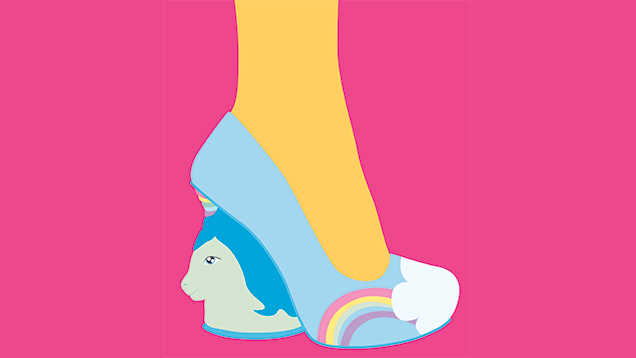Keep your unusual unicorn pumps at home
 CREDIT: CANDIS BROSS
CREDIT: CANDIS BROSSMake sure you know what footwear is appropriate and safe before your first day at a new job
Everyone has heard about the dangers of not wearing the right footwear for the occasion: sprained ankles when hiking in sneakers; scraped feet while wearing flipflops while cycling; the list goes on.
In the workplace though, not having the correct footwear can cause more than an inconvenience. Anything from corrosive liquids causing severe burns and skin damage to the loss of toes or limbs and resulting nerve damage from being crushed can occur, and that doesn’t sound like the way you want to start out a new career.
But there are easy ways to stop this from happening, starting with listening to your employer’s safety procedures.
For many students, weekly inclass labs are the first real taste of what their career will be like. Jay March, Fanshawe College’s laboratory technologist of Applied Science and Technology (AST) for the last 16 years, had some helpful advice when it comes to protecting yourself adequately.
“It’s really important to follow the safety rules because they’re there for a reason and they’re there usually to protect you,” March said. “[It’s] not [to] make you feel uncomfortable, and not for you to not have fashionable footwear, but it’s there for your safety and that’s of the utmost importance.”
He added that not a single foot injury has occurred during his time as the AST technologist, crediting it to all his students simply following the safety rules.
But what are the rules?
Legally speaking, the Ontario Occupational Health and Safety Act states the duties of your supervisor include, “[Ensuring] that a worker uses or wears the equipment, protective devices or clothing that the worker’s employer requires to be used or worn” and “[advising] a worker of the existence of any potential or actual danger to the health or safety of the worker of which the supervisor is aware.”
Essentially, it means that whoever’s in charge of you needs to make sure you are wearing the correct work gear, and know the risks associated with the job. That’s the bare minimum your workplace must provide. But employers usually have reams of safety procedures, so be sure to take in a lot of information when you first get the job.
So, what footwear is acceptable for different jobsites? First, a good rule of thumb is that open toed shoes are not acceptable at any workplace, so just leave them at home. If you work in law or financial offices, your best bet is to get a pair of comfortable dress shoes, make sure they’re padded or have room for insoles. The extra impact due to the raised heel causes more force exerted on both the balls of your feet and the heel, and having that padding helps in dispersing the pressure back to the arch.
Working in a lab, healthcare or retail position gives more flexibility in the footwear available. One easy recommendation is to buy shoes from a culinary clothing site like chefuniforms.com. Kitchen workers are on their feet for up to 12 hours a day on grimy floors. Buying chef shoes ensures you won’t be sliding around due to a spill, and they’re generally heavy duty enough to stop hot liquids from reaching the foot. Kitchen footwear also comes in a variety of styles, so it’s much easier to find a style more suited to your personal taste.
Construction and factory workers have a harder time though, as there are simply more dangers facing them, from screw and nail punctures to stray electricity. Knowing exactly what hazards you face on the job is necessary to pick the right work boots, though almost always your footwear will need a steel or composite toe, stopping any possible crushing damage.
If you work outside in extreme weather, water or weatherproofing might be necessary. As always, comfort is also a priority, as you don’t want to be lugging building supplies and tools around all day with your boots giving you blisters, or worse, your foot slipping inside, possibly causing skin tearing or muscle damage.
What about workplaces that don’t tell you what you need? Let’s be serious, not all people are employed in strictly legal jobs, working under the counter to save on taxes, or helping a neighbour with some manual labour.
But if you’re going to be working in hazardous condition, you must also be responsible for your own safety, because sometimes humans make mistakes and forget things. Remember you want to buy quality footwear. Spending an extra $20 or $30 on proper footwear can save you from having to buy another pair quicker than you want. It’s better to be over-prepared and safe than unprepared and injured.














